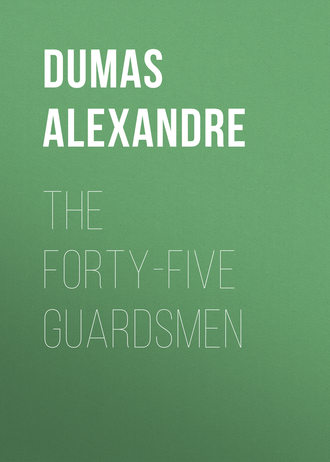
Александр Дюма
The Forty-Five Guardsmen
CHAPTER XL.
BEL-ESBAT
It is needless to say that Ernanton, whom St. Maline thought ruined, was, on the contrary, pursuing the course of his unexpected and ascending fortunes. He had, of course, gone first to the Hotel Guise. There, after having knocked at the great door and had it opened, he was only laughed at when he asked for an interview with the duchess. Then, as he insisted, they told him that he ought to know that her highness lived at Soissons and not at Paris. Ernanton was prepared for this reception, so it did not discourage him.
"I am grieved at her highness's absence," said he, "for I had a communication of great importance to deliver to her from the Duc de Mayenne."
"From the Duc de Mayenne! Who charged you to deliver it?"
"The duke himself."
"The duke! and where, pray? for he is not at Paris either!"
"I know that, as I met him on the road to Blois."
"On the road to Blois?" said the porter, a little more attentive.
"Yes, and he there charged me with a message for Madame de Montpensier."
"A message?"
"A letter." – "Where is it?"
"Here," said Ernanton, striking his doublet.
"Will you let me see it?"
"Willingly." And Ernanton drew out the letter.
"What singular ink!" said the man.
"It is blood," said Ernanton, calmly.
The porter grew pale at these words, and at the idea that this blood belonged to M. de Mayenne. At this time, when there was great dearth of ink and abundance of blood spilled, it was not uncommon for lovers to write to their mistresses, or absent relations to their families, in this liquid.
"Monsieur," said the servant, "I do not know if you will find Madame de Montpensier in Paris or its environs; but go to a house in the Faubourg St. Antoine, called Bel-Esbat, which belongs to the duchesse; it is the first on the left hand going to Vincennes, after the convent of the Jacobins. You will be sure to find some one there in the service of the duchesse sufficiently in her confidence to be able to tell you where Madame la Duchesse is just now."
"Thank you," said Ernanton, who saw that the man either could or would say no more.
He found Bel-Esbat easily, and without more inquiries, rang, and the door opened.
"Enter," said a man, who then seemed to wait for some password, but as Ernanton did not give any, he asked him what he wanted.
"I wish to speak to Madame la Duchesse de Montpensier."
"And why do you come here for her?"
"Because the porter at the Hotel Guise sent me here."
"Madame la Duchesse is not here."
"That is unlucky, as it will prevent me from fulfilling the mission with which M. de Mayenne charged me."
"For Madame la Duchesse?"
"Yes."
"From M. le Duc de Mayenne?"
"Yes."
The valet reflected a moment. "Monsieur," said he, "I cannot answer; there is some one else whom I must consult. Please to wait."
"These people are well served," thought Ernanton. "Certainly, they must be dangerous people who think it necessary to hide themselves in this manner. One cannot enter a house of the Guises as you can the Louvre. I begin to think that it is not the true king of France whom I serve."
He looked round him; the courtyard was deserted, but all the doors of the stables were open, as if they expected some troop to enter and take up their quarters. He was interrupted by the return of the valet, followed by another.
"Leave me your horse, monsieur," said he, "and follow my comrade; you will find some one who can answer you much better than I can."
Ernanton followed the valet, and was shown into a little room, where a simply though elegantly dressed lady was seated at an embroidery frame.
"Here is the gentleman from M. de Mayenne, madame," said the servant.
She turned, and Ernanton uttered a cry of surprise.
"You, madame!" cried he, recognizing at once his page and the lady of the litter.
"You!" cried the lady in her turn, letting her work drop, and looking at Ernanton.
"Leave us," said she to the valet.
"You are of the household of Madame de Montpensier, madame?" said Ernanton.
"Yes; but you, monsieur, how do you bring here a message from the Duc de Mayenne?"
"Through unforeseen circumstances, which it would take too long to repeat," replied Ernanton, cautiously.
"Oh! you are discreet, monsieur," said the lady, smiling.
"Yes, madame, whenever it is right to be so."
"But I see no occasion for your discretion here; for, if you really bring a message from the person you say – Oh! do not look angry; if you really do, I say, it interests me sufficiently that, in remembrance of our acquaintance, short though it was, you should tell it to me."
The lady threw into these words all the caressing and seductive grace that a pretty woman can.
"Madame," replied Ernanton, "you cannot make me tell what I do not know."
"And still less what you will not tell."
"Madame, all my mission consists in delivering a letter to her highness."
"Well, then, give me the letter," said the lady, holding out her hand.
"Madame, I believed I had had the honor of telling you that this letter was addressed to the duchesse."
"But, as the duchesse is absent, and I represent her here, you may – "
"I cannot, madame."
"You distrust me, monsieur?"
"I ought to do so, madame; but," said the young man, with an expression there was no mistaking, "in spite of the mystery of your conduct, you have inspired me, I confess, with very different sentiments."
"Really," said the lady, coloring a little under Ernanton's ardent gaze.
Ernanton bowed.
"Take care, monsieur," said she, laughing, "you are making a declaration of love."
"Yes, madame; I do not know if I may ever see you again, and the opportunity is too precious for me to let it slip."
"Then, monsieur, I understand."
"That I love you, madame; that is easy to understand."
"No, but how you came here."
"Ah, pardon, madame, but now it is I who do not understand."
"I think that, wishing to see me again, you invented a pretext to get in."
"I, madame! you judge me ill. I was ignorant if I should ever see you again, and I hoped only from chance, which already had twice thrown me in your way; but invent a pretext I could never do. I am strange, perhaps; I do not think like all the world."
"Oh! you say you are in love, and you have scruples as to the manner of introducing yourself again to her you love. It is very fine, monsieur, but I partly guessed it."
"How, madame, if you please?"
"The other day you met me; I was in a litter, you recognized me, and you did not follow me."
"Madame, you are confessing you paid some attention to me."
"And why not? Surely the way in which we first met justified my putting my head out of my litter to look after you when you passed. But you galloped away, after uttering an 'Ah!' which made me tremble in my litter."
"I was forced to go away, madame."
"By your scruples?"
"No, madame, by my duty."
"Well!" said the lady, laughing, "I see that you are a reasonable, circumspect lover, who, above all things, fears to compromise himself."
"If you had inspired me with certain fears, there would be nothing astonishing in it. Is it customary that a woman should dress as a man, force the barriers, and come to see an unfortunate wretch drawn to pieces, using meanwhile all sorts of gesticulations perfectly incomprehensible?"
The lady grew rather pale, although she tried to smile.
Ernanton went on. "Is it natural also that this lady, after this strange announcement, fearful of being arrested, should fly as though she were a thief, although she is in the service of Madame de Montpensier, a powerful princess, although not much in favor at court?"
This time the lady smiled again, but ironically.
"You are not clear-sighted, monsieur, in spite of your pretension to be an observer: for, with a little sense, all that seems obscure to you would have been explained. Was it not very natural that Madame de Montpensier should be interested in the fate of M. de Salcede, in what he might be tempted to say, what true or false revelations he might utter to compromise the house of Lorraine? And if that was natural, monsieur, was it not also so, that this princess should send some one, some safe, intimate friend, to be present at the execution, and bring her all the details? Well, monsieur, this person was I. Now, do you think I could go in my woman's dress? Do you think I could remain indifferent to what was going on?"
"You are right, madame; and now I admire as much your logic and talent as I did before your beauty."
"Thank you, monsieur. And now that we know each other, and that everything is explained, give me the letter, since it does exist."
"Impossible, madame."
The unknown seemed trying not to grow angry. "Impossible?" repeated she.
"Yes, impossible; for I swore to M. de Mayenne to deliver it only to the duchesse herself."
"Say, rather," cried the lady, giving way to her irritation, "that you have no letter; that, in spite of your pretended scruples, it was a mere pretext for getting in here; that you wished to see me again, and that was all. Well, monsieur, you are satisfied; not only you have effected your entrance, but you have seen me, and have told me you adore me."
"In that, as in all the rest, I have told you truth, madame."
"Well, so be it, you adore me; you wished to see me, and you have seen me. I have procured you a pleasure in return for a service. We are quits. Adieu!"
"I will obey you, madame; since you send me away, I will go."
"Yes," cried she, now really angry, "but if you know me, I do not know you. You have too much advantage over me. Ah! you think you can enter, on some pretext, into the house of a princess, and go away and say, 'I succeeded in my perfidy.' Ah! monsieur, that is not the behavior of a gallant man."
"It seems to me, madame, that you are very hard on what would have been, after all, only a trick of love, if it had not been, as I have already told you, an affair of the greatest importance. I put aside all your injurious expressions, and I will forget all I might have said, affectionate or tender, since you are so badly disposed toward me. But I will not go out from here under the weight of your unworthy suspicions. I have a letter from the duke for Madame de Montpensier, and here it is; you can see the handwriting and the address."
Ernanton held out the letter to the lady, but without leaving go of it.
She cast her eyes on it, and cried, "His writing! Blood!"
Without replying, Ernanton put the letter back in his pocket, bowed low, and, very pale and bitterly hurt, turned to go. But she ran after him, and caught him by the skirt of his cloak.
"What is it, madame?" said he.
"For pity's sake, pardon me; has any accident happened to the duke?"
"You ask me to pardon you, only that you may read this letter, and I have already told you that no one shall read it but the duchesse."
"Ah! obstinate and stupid that you are," cried the duchess, with a fury mingled with majesty; "do you not recognize me? – or rather, could you not divine that I was the mistress? – and are these the eyes of a servant? I am the Duchesse de Montpensier; give me the letter."
"You are the duchesse!" cried Ernanton, starting back.
"Yes, I am. Give it to me; I want to know what has happened to my brother."
But instead of obeying, as the duchess expected, the young man, recovering from his first surprise, crossed his arms.
"How can I believe you, when you have already lied to me twice?"
The duchess's eyes shot forth fire at these words, but Ernanton stood firm.
"Ah! you doubt still – you want proofs!" cried she, tearing her lace ruffles with rage.
"Yes, madame."
She darted toward the bell, and rang it furiously; a valet appeared.
"What does madame want?" said he.
She stamped her foot with rage. "Mayneville!" cried she, "I want Mayneville. Is he not here?"
"Yes, madame."
"Let him come here."
The valet went, and, a minute after, Mayneville entered.
"Did you send for me, madame?" said he.
"Madame! And since when am I simply madame?" cried she angrily.
"Your highness!" said Mayneville, in surprise.
"Good!" said Ernanton, "I have now a gentleman before me, and if he has lied, I shall know what to do."
"You believe then, at last?" said the duchess.
"Yes, madame, I believe, and here is the letter;" and, bowing, the young man gave to Madame de Montpensier the letter so long disputed.
CHAPTER XLI.
THE LETTER OF M. DE MAYENNE
The duchess seized the letter, opened it, and read it eagerly, while various expressions passed over her face, like clouds over the sky. When she had finished, she gave it to Mayneville to read. It was as follows:
"MY SISTER – I tried to do myself the work I should have left to others, and I have been punished for it. I have received a sword wound from the fellow whom you know. The worst of it is, that he has killed five of my men, and among them Boularon and Desnoises, who are my best, after which he fled. I must tell you that he was aided by the bearer of this letter, a charming young man, as you may see. I recommend him to you; he is discretion itself.
"One merit which he will have, I presume, in your eyes, my dear sister, is having prevented my conqueror from killing me, as he much wished, having pulled off my mask when I had fainted, and recognized me.
"I recommend you, sister, to discover the name and profession of this discreet cavalier; for I suspect him, while he interests me. To my offers of service, he replied that the master whom he served let him want for nothing.
"I can tell you no more about him, but that he pretends not to know me. I suffer much, but believe my life is not in danger. Send me my surgeon at once; I am lying like a horse upon straw, the bearer will tell you where.
"Your affectionate brother,
"MAYENNE."
When they had finished reading, the duchess and Mayneville looked at each other in astonishment. The duchess broke the silence first.
"To whom," said she, "do we owe the signal service that you have rendered us, monsieur?"
"To a man who, whenever he can, helps the weak against the strong."
"Will you give me some details, monsieur?"
Ernanton told all he had seen, and named the duke's place of retreat.
Madame de Montpensier and Mayneville listened with interest. When he had finished, the duchess said:
"May I hope, monsieur, that you will continue the work so well begun, and attach yourself to our house?"
These words, said in the gracious tone that the duchess knew so well how to use, were very flattering to Ernanton, after the avowal which he had made; but the young man, putting vanity aside, attributed them to simple curiosity.
He knew well that the king, in making it a condition that he should reveal the duchess's place of abode, had some object in view. Two interests contended within him – his love, that he might sacrifice; and his honor, which he could not. The temptation was all the stronger, that by avowing his position near the king, he should gain an enormous importance in the eyes of the duchess; and it was not a light consideration for a young man to be important in the eyes of the Duchesse de Montpensier. St. Maline would not have resisted a minute. All these thoughts rushed through Ernanton's mind, but ended by making him stronger than before.
"Madame," said he, "I have already had the honor of telling M. de Mayenne that I serve a good master, who treats me too well for me to desire to seek another."
"My brother tells me in his letter, monsieur, that you seemed not to recognize him. How, if, you did not know him, then, did you use his name to penetrate to me?"
"M. de Mayenne seemed to wish to preserve his incognito, madame; and I, therefore, did not think I ought to recognize him; and it might have been disagreeable for the peasants to know what an illustrious guest they were entertaining. Here there was no reason for secrecy; on the contrary, the name of M. de Mayenne opened the way to you; so I thought that here, as there, I acted rightly."
The duchess smiled, and said, "No one could extricate himself better from an embarrassing question: and you are, I must confess, a clever man."
"I see no cleverness in what I have had the honor of telling you, madame."
"Well, monsieur," said the duchess, impatiently, "I see clearly that you will tell nothing. You do not reflect that gratitude is a heavy burden for one of my house to bear; that you have twice rendered me a service, and that if I wished to know your name, or rather who you are – "
"I know, madame, you would learn it easily; but you would learn it from some one else, and I should have told nothing."
"He is always right," cried the duchess, with a look which gave Ernanton more pleasure than ever a look had done before. Therefore he asked no more, but like the gourmand who leaves the table when he thinks he has had the best bit, he bowed, and prepared to take leave.
"Then, monsieur, that is all you have to tell me?" asked the duchess.
"I have executed my commission, and it only remains for me to present my humble respects to your highness."
The duchess let him go, but when the door shut behind him, she stamped her foot impatiently.
"Mayneville," said she, "have that young man followed."
"Impossible, madame; all our household are out, I myself am waiting for the event. It is a bad day on which to do anything else than what we have decided to do."
"You are right, Mayneville; but afterward – "
"Oh! afterward, if you please, madame."
"Yes; for I suspect him, as my brother does."
"He is a brave fellow, at all events; and really we are lucky, a stranger coming to render us such a service."
"Nevertheless, Mayneville, have him watched. But night is falling, and Valois must be returning from Vincennes."
"Oh! we have time before us; it is not eight o'clock, and our men have not arrived."
"All have the word, have they not?"
"All." – "They are trustworthy?"
"Tried, madame."
"How many do you expect?"
"Fifty; it is more than necessary, for besides them we have two hundred monks, as good as soldiers, if not better."
"As soon as our men have arrived, range your monks on the road."
"They are all ready, madame; they will intercept the way, our men will push the carriage toward them, the gates of the convent will be open, and will have but to close behind the carriage."
"Let us sup, then, Mayneville, it will pass the time. I am so impatient, I should like to push the hands of the clock."
"The hour will come; be easy."
"But our men?"
"They will be here; it is hardly eight."
"Mayneville, my poor brother asks for his surgeon; the best surgeon, the best cure for his wound, will be a lock of the Valois's shaved head, and the man who should carry him that present, Mayneville, would be sure to be welcome."
"In two hours, madame, that man shall set out to find our dear duke in his retreat; he who went out of Paris as a fugitive shall return triumphantly."
"One word more, Mayneville; are our friends in Paris warned?"
"What friends?" – "The leaguers."
"Heaven forbid, madame; to tell a bourgeois is to tell all Paris. Once the deed is done, and the prisoner safe in the cloister, we can defend ourselves against an army. Then we should risk nothing by crying from the roof of the convent, 'We have the Valois!'"
"You are both skillful and prudent, Mayneville. Do you know, though, that my responsibility is great, and that no woman will ever have conceived and executed such a project?"
"I know it, madame; therefore I counsel you in trembling."
"The monks will be armed under their robes?"
"Yes."
"Mind you kill those two fellows whom we saw pass, riding at the sides of the carriage, then we can describe what passes as pleases us best."
"Kill those poor devils, madame! do you think that necessary?"
"De Loignac! would he be a great loss?"
"He is a brave soldier."
"A parvenu, like that other ill-looking fellow who pranced on the left, with his fiery eyes and his black skin."
"Oh! that one I do not care so much about; I do not know him, and I agree with your highness in disliking his looks."
"Then you abandon him to me?" laughed the duchess.
"Oh! yes, madame. What I said was only for your renown, and the morality of the party that we represent."
"Good; Mayneville, I know you are a virtuous man, and I will sign you a certificate of it if you like. You need have nothing to do with it; they will defend the Valois and get killed. To you I recommend that young man."
"Who?"
"He who just left us; see if he be really gone, and if he be not some spy sent by our enemies."
Mayneville opened the window, and tried to look out.
"Oh! what a dark night," said he.
"An excellent night: the darker the better. Therefore, good courage, my captain."
"Yes, but we shall see nothing."
"God, whom we fight for, will see for us."
Mayneville, who did not seem quite so sure of the intervention of Providence in affairs of this nature, remained at the window looking out.
"Do you see any one?" asked the duchess.
"No, but I hear the tramp of horses."
"It is they; all goes well." And the duchess touched the famous pair of golden scissors at her side.







